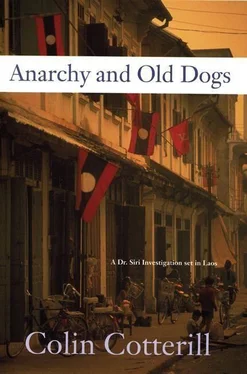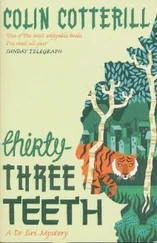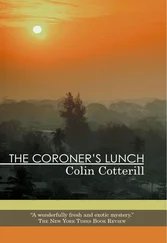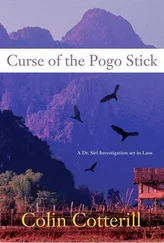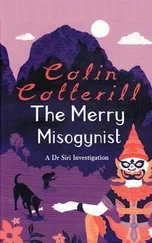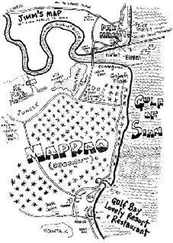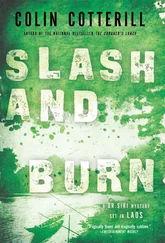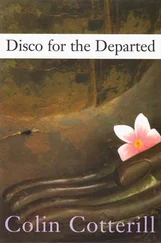Colin Cotterill - Anarchy and the Old Dogs
Здесь есть возможность читать онлайн «Colin Cotterill - Anarchy and the Old Dogs» весь текст электронной книги совершенно бесплатно (целиком полную версию без сокращений). В некоторых случаях можно слушать аудио, скачать через торрент в формате fb2 и присутствует краткое содержание. Жанр: Криминальный детектив, на английском языке. Описание произведения, (предисловие) а так же отзывы посетителей доступны на портале библиотеки ЛибКат.
- Название:Anarchy and the Old Dogs
- Автор:
- Жанр:
- Год:неизвестен
- ISBN:нет данных
- Рейтинг книги:3 / 5. Голосов: 1
-
Избранное:Добавить в избранное
- Отзывы:
-
Ваша оценка:
- 60
- 1
- 2
- 3
- 4
- 5
Anarchy and the Old Dogs: краткое содержание, описание и аннотация
Предлагаем к чтению аннотацию, описание, краткое содержание или предисловие (зависит от того, что написал сам автор книги «Anarchy and the Old Dogs»). Если вы не нашли необходимую информацию о книге — напишите в комментариях, мы постараемся отыскать её.
Anarchy and the Old Dogs — читать онлайн бесплатно полную книгу (весь текст) целиком
Ниже представлен текст книги, разбитый по страницам. Система сохранения места последней прочитанной страницы, позволяет с удобством читать онлайн бесплатно книгу «Anarchy and the Old Dogs», без необходимости каждый раз заново искать на чём Вы остановились. Поставьте закладку, и сможете в любой момент перейти на страницу, на которой закончили чтение.
Интервал:
Закладка:
Pakse was a city without a center. It sat in the armpit between the Se Don and the Mekhong rivers, its suburbs only recently venturing across their banks. It wasn’t a place with a distinguished history. That mantle was held by Bassak, twenty-five miles downriver. That city, the old capital of Champasak, had been the seat of omnipotent and notorious regents: a place of legends. At one period in history it had been the heart of the southern kingdom, then one day it had ceased to beat, had lost the will to be great.
Pakse, on the other hand, had always been a more logical base for trade because of the confluence of the rivers and its proximity to Thailand. The French had recognized this fact and made it their center of administration in the south. The only wonder was why it hadn’t become the capital sooner. Once deserted, Bassak fell to ruin. As any good historian knows, nostalgia is always a poor relative to commerce.
So, as a city built on greed, Pakse was never likely to be a place one would visit just for enjoyment. There was nothing grand or spectacular to put on a postcard and impress people at home. Not even the ugly unfinished palace of the exiled regent warranted a photograph. The government buildings were practical and basic; the houses had been constructed for seeing out of. Even the temples were pale recent copies of their sisters in the north. The roads were yellow clay and what few plants had survived the development were camouflaged in its grime. If the northern capital of Luang Prabang was a jewel in the Indochinese crown, Pakse was the seat of the royal underpants.
Siri and Civilai obviously weren’t occupying adjoining rooms on the second floor of the Pakse Hotel to partake in the joys of city sightseeing. Civilai had turned up there without his trademark glasses and wearing a monk’s tight woolen beanie. He’d checked in under the name of Sawan and was certain the night clerk had no idea who he was. Nobody knew or cared who Siri was, so he checked in under his own name. The two counterrevolutionaries sat on the edge of Civilai’s bed staring at the amazing cross-stitch depiction of stags in a Nordic stream that had been framed and hung on the wall. A ceiling fan rocked perilously above their heads.
“Makes you want to go to Scandinavia, doesn’t it?” Siri said.
“What time is it?”
“Eight.”
They’d left Wattay Airport early and made good time. There would be no knowledge gained with regard to their quest until daylight.
“Want to do something?”
They arrived at the little Pakse Cinema ten minutes after the film had started. It was a delight to be there. The Odeon, the only picture house in Vientiane, had been commandeered as a political lecture hall. The day that happened, Civilai and Siri’s hearts had been deprived of oxygen. They’d been starved of one more breath of culture. The old boys were movie aficionados: addicts, some might say. Their habit had been nurtured in the smoky cinemas of Paris. In Hanoi, and in the caves of Huaphan, they’d attended every film projection, no matter how desperately awful the movie on offer promised to be. They were perhaps the only two in the audience to derive pleasure from such blockbusters as Rural Sanitation in Southern Yunan and The Benefits of Oiling Your Weapon. They’d left the cinema cave in tears after a showing of The Public Humiliation of an Illiterate Goat Herder. The films didn’t matter. It was the atmosphere they loved, that truly social feeling of strangers sharing emotions, laughing together, being thoroughly depressed together, being moved as one, like passengers on a funfair ride. They missed it: that instant communism.
As they paid their hundred kip they heard gales of laughter emanating from inside the picture house. The cashier told them they should go through the heavy black doors and wait until their eyes were accustomed to the darkness. Then they could sit wherever they liked. The house wasn’t full Not too many people could afford a night out at the cinema these days. A hundred kip was almost forty cents, and money like that could be better spent.
They did as they were told, stood inside the thick curtain door and waited until their eyes could tell the difference between empty seats and laps. They settled into two seats close to the exit and stared wide eyed at the screen. It was a marvelous sight. A bare-chested Chinese-Bruce Lee, according to the poster-was standing bravely at the center of a circle of evil-looking hoodlums. There was no soundtrack. At the front of the cinema, silhouetted against the bottom of the screen, sat three artistes. One was a man surrounded by a collection of musical instruments. He was well illuminated by a spotlight that cast a halo onto the film. The other two were actors. One male, one female, judging from their outlines. They had only small electric bulbs in front of them, illuminating their scripts. These were the interpreters of the film.
Bruce looked to one side and stared directly at the ringleader of the gangsters.
“You seem to underestimate the Lao Democratic Republic,” he said in a high-pitched voice. The mouth movement was far more economical than the words he spoke. The audience chuckled. Siri grabbed his friend’s arm.
“Ha,” said the villain in a deep manly voice. “We represent the oppressive West. You know we shall always be victorious over small fry such as you and the community farmers of which you are one.”
“You are a usurper of agronomic labor,” said Bruce. “I shall teach you a lesson.” To the accompaniment of cymbals and something like a kazoo, he proceeded to beat the stuffing out of the attackers, no doubt appreciative of the fact that they approached him one by one rather than en masse.
Soon only Bruce and the evil Asian lapdog of colonial oppression remained standing. The latter’s eyebrows suggested he felt helpless without his gang of handpicked henchmen, just as the Royalist regime would have felt without its American lackeys to hide behind. Bruce, the Lao Democratic Republic incarnate, flexed his bloodied biceps in the direction of his oppressor foe.
“So, it’s just you and me,” Bruce said. “Me, the representative of the honest people of the land. You, a capitalist who would gladly sell the soil beneath our feet to the foreign devils.”
The lips of the protagonist and antagonist had not actually moved during this altercation. Siri and Civilai were rocking in their seats with laughter, their cheeks wet with tears. They thought it couldn’t get any better, but it did. To the gasps of the audience, the capitalist who would sell the soil from beneath their feet somersaulted backward onto a roof, saying, “We slaves of the Western money culture will always prevail, you common coolie.” And then vanished.
Bruce was devastated that the lower classes had once again become the victims of the idle rich, but a woman’s voice from offscreen shouted, “The Republic of Laos loves you, Somchit, for protecting us from foreign aggression. Our day will come.”
The audience cheered, and Siri and Civilai slapped their palms together, breathless with laughter.
“Now this,” Siri wheezed at last, “is entertainment.”
Ten rows behind them sat the only man in the audience who wasn’t enjoying the show. His military uniform now replaced by slacks and a short-sleeved sports shirt, the tight-cheeked passenger from the Yak flight kept his eyes firmly focused on the backs of his targets. A Type 77 Chinese pistol jutted uncomfortably into his belt.
The 220-Volt Bathtub
After a disappointing breakfast of Vietnamese lentil soup and stale baguettes, Siri and Civilai walked from the Pakse Hotel into another overcast, steamy morning. The same type of stodgy cloud they’d left behind in Vientiane was hanging over them like soft bread. The whole country had become a sandwich. The town’s reluctance to turn itself into a real city that welcomed visitors was evident in its lack of footpaths and its abundance of deep holes. The only buildings that didn’t look like they might blow down in a strong gale were government departments housed in Franco-Chinese blocks with thick walls and gaping windows that threw forth their wooden shutters like bat wings. Nothing was really white-not the whitewash on the temple walls or the street signs, or the eyes or teeth of the dowdy people they passed. Bullock carts and small pony traps overtook them in the street, and both the drivers and the beasts they drove glanced back discreetly at the two old men. Civilai in a peaked cap and dark glasses looked like the undernourished older relative of a Cuban revolutionary. Siri bounded along beside him.
Читать дальшеИнтервал:
Закладка:
Похожие книги на «Anarchy and the Old Dogs»
Представляем Вашему вниманию похожие книги на «Anarchy and the Old Dogs» списком для выбора. Мы отобрали схожую по названию и смыслу литературу в надежде предоставить читателям больше вариантов отыскать новые, интересные, ещё непрочитанные произведения.
Обсуждение, отзывы о книге «Anarchy and the Old Dogs» и просто собственные мнения читателей. Оставьте ваши комментарии, напишите, что Вы думаете о произведении, его смысле или главных героях. Укажите что конкретно понравилось, а что нет, и почему Вы так считаете.
